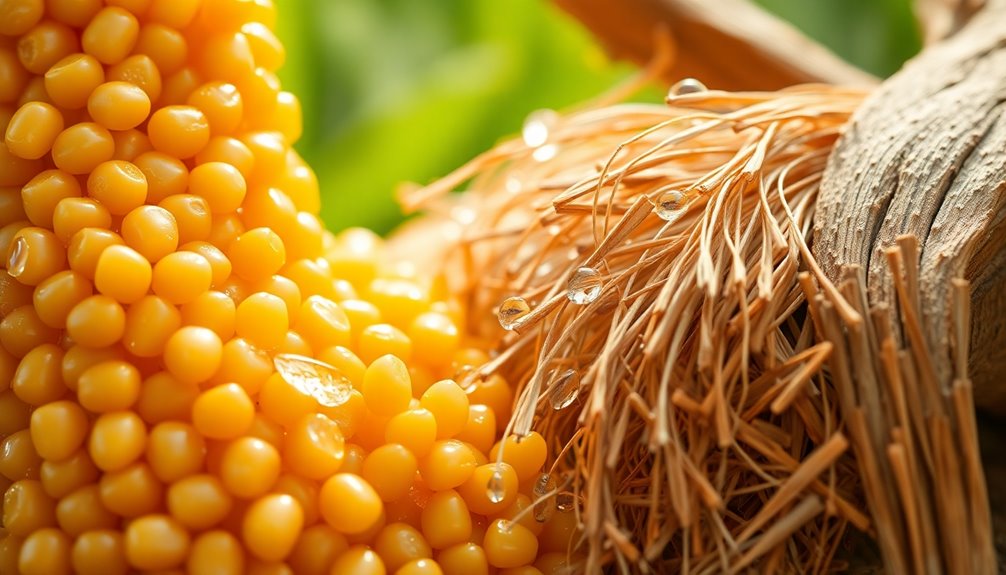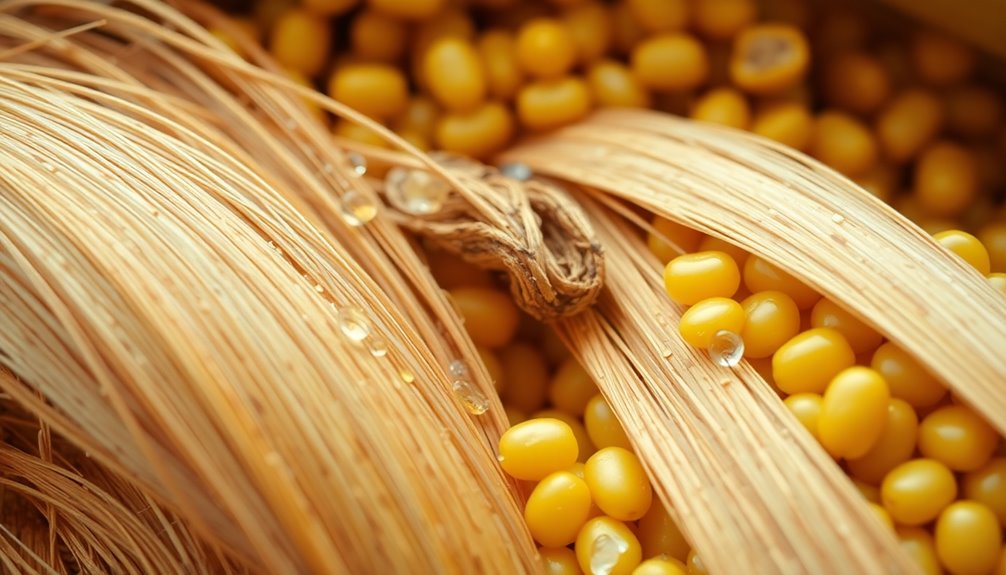Wood fiber and corn protein are transforming the detergent landscape, giving you an eco-friendly and effective cleaning option. These sustainable ingredients are biodegradable, reducing water pollution and supporting healthier ecosystems. Thanks to their powerful emulsifying properties, they tackle tough stains without leaving residue on fabrics. Plus, they're gentle on sensitive skin and cut down on packaging waste. Discover how these innovative components can enhance your laundry routine and benefit the planet as you explore more.
Key Takeaways
- Sustainable detergents utilize wood fiber and corn protein, making them eco-friendly and effective against tough stains.
- Biodegradable ingredients minimize water pollution and promote healthier ecosystems.
- Wood fibers enhance stain removal, while corn proteins stabilize emulsions for superior cleaning efficiency.
- These detergents are free from harsh chemicals, reducing skin irritation and promoting safety for sensitive users.
- Cost-effective and concentrated formulas support eco-conscious living while reducing packaging waste.

As more people become aware of the impact their choices have on the environment, sustainable detergents are gaining traction. Among these innovative products, wood fiber and corn protein are taking center stage. These natural ingredients aren't only eco-friendly but also effective at tackling tough stains without harmful chemicals. By choosing detergents made from these renewable sources, you're supporting a healthier planet.
Wood fibers and corn proteins serve as the backbone of this new generation of detergents. They're biodegradable and help reduce water pollution, which is a significant issue linked to traditional cleaning products. In fact, the use of biodegradable ingredients helps minimize the risk of algal blooms and soil contamination caused by harsh chemicals like phosphates. By opting for these eco-friendly alternatives, you're contributing to cleaner water and healthier ecosystems.
Wood fibers and corn proteins create biodegradable detergents that combat water pollution and support healthier ecosystems.
One of the remarkable features of these sustainable detergents is their ability to form effective emulsions. The cellulose in wood fibers attracts and repels water, aiding in stain removal, while corn protein stabilizes those emulsions, trapping oils and enhancing cleaning efficiency. You'll notice that these detergents not only remove stains like ink and chili oil but also leave no residue on your fabrics after washing. This means your clothes feel fresher and cleaner without the harsh aftereffects of traditional products. Additionally, these products are often free from harsh chemicals, which helps reduce skin irritation and allergies.
Moreover, these eco-friendly options are often optimized for cold water washes, reducing energy consumption and greenhouse gas emissions. You'll find that concentrated formulas require less product per load, cutting down on packaging waste and further supporting sustainable practices.
Plus, you're likely to experience fewer skin irritations and allergies since these detergents are free from harsh chemicals.
In choosing wood fiber and corn protein detergents, you're making a smart, cost-effective decision for your home and the environment. Your choices matter, and with sustainable detergents, you can clean your clothes while caring for the Earth.
Frequently Asked Questions
What Are the Benefits of Using Wood Fiber in Detergents?
Using wood fiber in detergents brings several benefits. It enhances stain removal by attracting and repelling water, making your cleaning process more effective.
The cellulose properties also aid in forming emulsions, ensuring dirt and oils are lifted away. Plus, wood fiber is biodegradable, meaning it won't harm the environment after use.
How Does Corn Protein Enhance Detergent Effectiveness?
Corn protein enhances detergent effectiveness in several ways.
It stabilizes the detergent emulsion, ensuring consistent cleaning performance. Its oil-trapping ability helps you tackle tough, oil-based stains more effectively.
You'll notice improved cleaning at higher concentrations, making it superior to standard options. Plus, it's gentle on fabrics, leaving no residue after washing.
Are These Ingredients Biodegradable?
Absolutely, these ingredients are like nature's superheroes!
Wood fiber and corn protein are both biodegradable, breaking down into harmless substances when exposed to the right conditions.
You'll be amazed to know that they can vanish like magic in soil, thanks to hungry microorganisms.
When you choose products with these ingredients, you're not just cleaning; you're also helping the planet breathe a little easier.
It's a win-win for you and Mother Earth!
Is This Detergent Safe for Sensitive Skin?
Yes, this detergent is likely safe for sensitive skin.
It uses natural ingredients that are hypoallergenic and gentle, reducing the risk of irritation. You won't find harsh synthetic chemicals in it, which often cause reactions.
Plus, the effective rinsing process ensures no residues linger on your fabrics. While more studies could confirm its safety, the natural composition suggests it's a good choice for those with skin sensitivities.
Can This Detergent Be Used in Cold Water Washes?
Did you know that washing in cold water can reduce your household's energy consumption by up to 90%?
You can definitely use this new eco-friendly detergent in cold water washes. It's formulated to work effectively at lower temperatures, making it a great choice for energy-efficient laundry.
Plus, using cold water helps preserve fabric quality and reduces microfiber shedding, so not only are you saving energy, but you're also being kinder to the environment.
Conclusion
In the quest for a cleaner planet, this new sustainable detergent is like a breath of fresh air, merging wood fiber and corn protein to create a powerful cleaning solution. By choosing this eco-friendly option, you're not just washing away dirt; you're also washing in a brighter future for our environment. So, let's embrace this innovative blend and make every load count towards sustainability—because every small choice you make can spark a wave of positive change.









